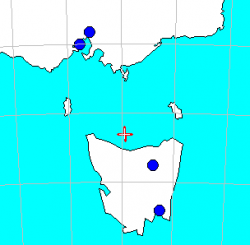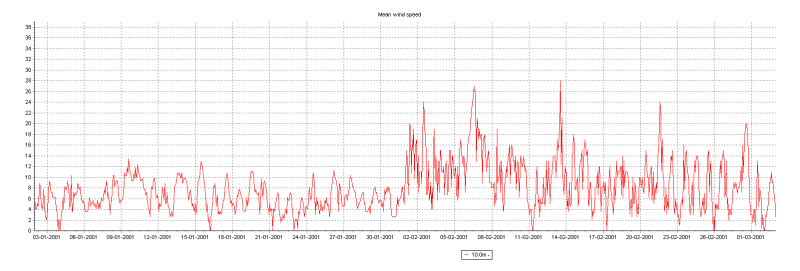METAR Data

The NCEP ADP METAR (Aviation Routine Weather Report) dataset is based on measurements from various airports and permanent weather observation stations around the globe. Currently, about 5000 stations are included in this global dataset. An example of the spatial coverage is shown in the figure to the right for the available stations near Tasmania, Australia. The purpose of the METARs is to provide guidance for pilots and the aviation industry, however some stations may also provide useful for the wind energy industry as reports of wind speed, wind directions and temperature are available, see the sample in Figure 10. thumb|600px|left|METAR data from the Launceston Airport in Australia. This airport provides data every 30 minutes.
Considerations
As in the case of a METAR dataset, when applying this dataset, please consider the following issues:
- The reporting frequency varies: Some stations report a few days per year, others only during daytime hours, while others report continuously with 10, 30 minute or hourly intervals.
- The position of the station may be uncertain. Typically latitude and longitude is only reported with an accuracy of two decimals (with position in decimal degrees).
- The height of the meteorological mast is uncertain, often 5, 10 or 30 meter masts are used; however the standard is 10 meters.
- Since an automated data collection procedure is used at NCAR; then errors may occur in data and position encoding. Please take care to validate this SYNOP dataset against local measurements and the position against local maps.
Interactive Map of SYNOP and METAR stations
{{#display_map:centre=tasmania |minzoom=4 |maxzoom=8 |zoom=6 |height=500 |width=800 |gkml=http://emd.dk/download/mlt/MeteorologicalStations.kmz }}
Important Note on Erroneous Wind Speeds
An issue has been reported for the SYNOP stations in 2001 and 2002, where data seem to have wind speeds about the double of what is expected. This issue is caused by the station not reporting in the correct unit (such as m/s or knots). Please take care to evaluate the data before applying it in tasks such as long term correction. As an example, see the sample in the figure below. The sample is from Cape Grim, Australia, where this error occurs from February 1st 2001 until June 12th 2002.

Acknowledgement
The data for this study are from the Research Data Archive (RDA) which is maintained by the Computational and Information Systems Laboratory (CISL) at the National Center for Atmospheric Research (NCAR). NCAR is sponsored by the National Science Foundation (NSF). The original data are available from the RDA (http://rda.ucar.edu) in dataset number ds461.0.